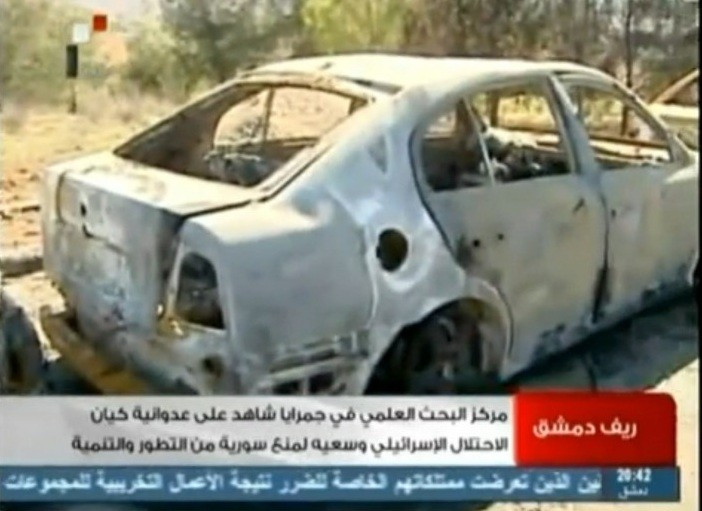Iran Threatens Retaliation for Israeli Airstrike on Syria

Syrian TV has broadcast images that it claims show the aftermath of an Israeli airstrike on a research centre on the outskirts of Damascus, prompting an Iranian military leader to warn of a "retaliatory blow" against the "criminals" responsible.
US officials say the strike hit a convoy transporting anti-aircraft weapons destined for the militant Lebanese group Hezbollah.
Syria, which initially denied the incident, later said the target was a scientific research facility in Jamraya, north-west of Damascus.
The first purported images of the site, shown on Al-Ikhbariya TV on 2 February, show destroyed cars, trucks and military vehicles, along with a damaged building. A caption read: "Consequences of the Israeli aggression on the Jamraya centre."
According to US government sources, Israeli aircraft struck a weapons convoy carrying Russian-made SA-17 anti-aircraft missiles near the town of al-Zabadani, close to the Lebanese border on Wednesday 30 January.
But in a statement, the Syrian government said the strike hit a scientific research facility in the suburb of Jamraya, north-west of Damascus.
Western intelligence agencies have said they suspect the site is a weapons manufacturing facility. The site has been the target of months of attacks by Syrian rebels, who believe it is a chemical weapons manufacturing plant.
The Assad regime said the strike was part of an Israeli plot, and evidence of a link between Israel and the militias seeking to bring down the government.
Syrian TV quoted the head of a clan in the Daraya area of Damascus saying Israeli intelligence had been operating a surveillance unit in the area, and the unit was passing on intelligence useful in planning and implementing attacks in Syria.
While the US version of what happened appears to be at odds with that of the Syrian regime, some reports have sought to link the accounts, with the convoy said to have been struck while parked at the Jamraya facility, and en route to the main highway to Lebanon, though reports remain unclear.
Addressing a conference in Munich on 3 February, Israeli defence minister Ehud Barak appeared to acknowledge Israel's involvement in the air strike.
"What happened in Syria several days ago is proof that when we said something we mean it... We say that we don't think it should be allowed to bring advanced weapons systems into Lebanon," he said.
Barak said he believed the defeat of the Assad regime would "happen imminently", adding: "This will be a major blow to the Iranians and Hezbollah. I think that they will pay the price."
En route to the same conference, Turkish foreign minister Ahmet Davutoglu condemned Israel's alleged strike, and urged Damascus to retaliate.
"Why didn't Assad even throw a pebble when Israeli jets were flying over his palace and playing with the dignity of his country?" the Hurriyet news agency quoted Davutoglu as saying.
"Why didn't the Syrian Army, which has been attacking its own innocent people for 22 months now - from the air with jets, and by land with tanks and artillery fire - respond to Israel's operation?
"Why can't Assad, who gave order to fire Scud missiles at Aleppo, do anything against Israel?" he asked.
He said he suspected Israel and the Assad regime were collaborating, but vowed Turkey would not allow Israel to attack a fellow Muslim country without retaliation.
In Iran, the deputy head of the armed forces, Brigadier General Masoud Jazayeri issued a dire warning that Israel would pay for its attack.
"Syria's response to the recent aggression of the Zionist regime against this country will send this regime into a coma," Brig Gen Jazayeri said.
"In the new era, the criminals should know that behind their every blow lies a massive retaliatory blow, whose time, level and magnitude will be determined by the resolve of the free and anti-hegemonic nations."
The chairman of Iran's parliament, Ali Larijani, blamed the US for standing in the way of resistance movements in the region.
"The world is witnessing a vengeance carried out by the West, particularly the US, and some backward elements in the region against resistance," he said.
Meanwhile, a senior Iranian security official has arrived in Damascus for talks with senior regime officials, including Assad.
Saeed Jalili, the secretary of Iran's Supreme National Security Council, met Syria's minister for national reconciliation, Ali Haidar, to discuss ways of promoting an Assad-backed initiative to end the conflict.
"Syria is considered the front line of the Muslim world in the face of the Zionist enemy," Jalili said. "Enemies are attacking the Syrian infrastructure and imposing economic sanctions on it, in a desperate attempt to break the resistance and steadfastness of the Syrian nation.
"It is our duty to provide all kinds of assistance to alleviate the Syrian people's suffering," he said.
Assad said in January that he wanted to hold national reconciliation talks and draft a new constitution, but would exclude rebel militias from the talks. Opposition groups rejected the proposals.
© Copyright IBTimes 2025. All rights reserved.





















